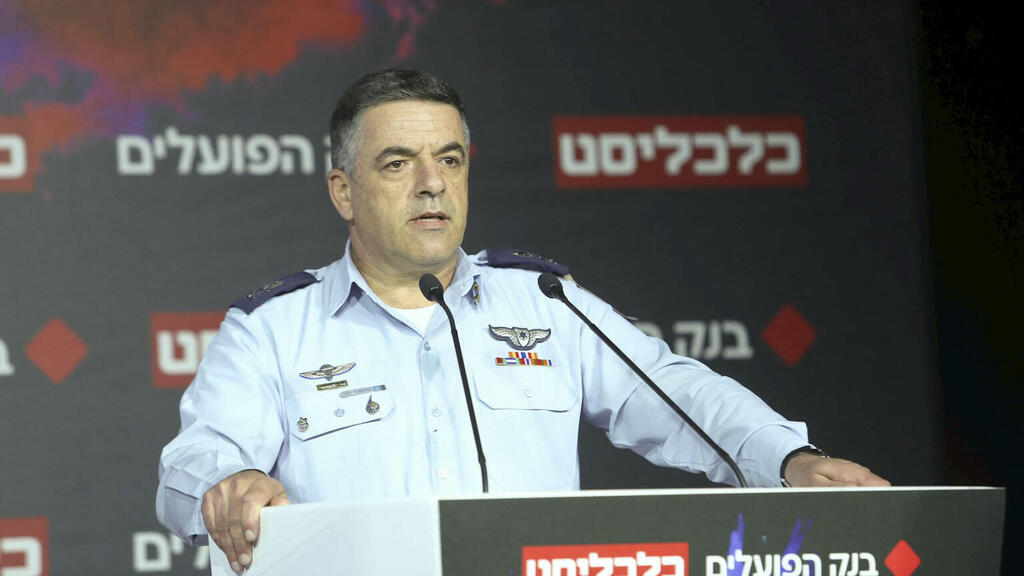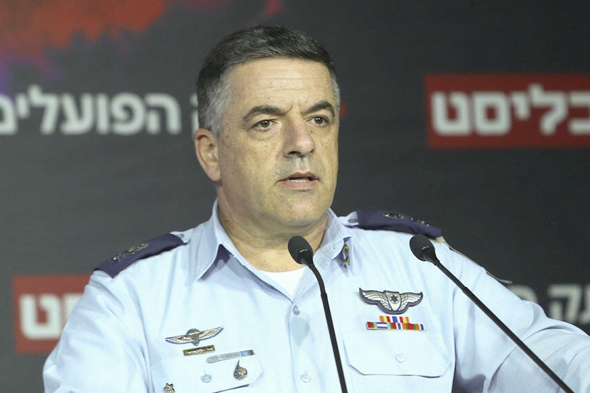
"Lasers will change the future battlefield," says Air Force commander
Speaking at the 2022 Forecasts Conference, Maj. Gen. Amikam Nurkin discussed cooperating with the U.S., and future challenges, “we want to get to a place where we know what is happening around us in space.”
Omer Kabir | 16:12, 29.12.21
“Throughout the next decade, the IDF, including the Air Force, will continue to be a very influential factor, both in terms of security and economy, in the State of Israel," said Air Force Commander Maj. Gen. Amikam Nurkin. Speaking at the 2022 Calcalist and Bank Hapoalim Forecasts Conference Wednesday at Expo Tel Aviv, Nurkin discussed the importance of integrating women in the service, showing, among other things, a photo of Shahar, a female deputy commander of an F-35 Squadron, and saying that “the number of women serving is on the rise. The goal is for the Air Force to be better and for the quality to be shared equally in Israeli society. "
According to Nurkin, "the Air Force is like a capsule, a microcosm of Israeli society." He noted that the IAF is responsible for more than 12% of the technology education in the country, adding: "we must expand technology education. When they finish their service, they are at a better productive point for the civilian market." The Air Force commander spoke, among other things, about the future battlefield and challenges expected on it, saying "we will see greater use of lasers on the battlefield. We will see it in defense and offense, from the ground and the air. The introduction of this technology to the future battlefield will change the latter." Another aspect Nurkin pointed to was space, adding that "we go further, we know how to attack deeper targets, to be more accurate on the battlefield. Now we have to go higher. We gather intelligence in space, carry communications and intercept ballistic missiles. But we want to get to a place where we know what is happening around us in space, we know how to manage the dimension of space and make it accessible within the future battlefield." "The Air Force's impact is reflected through direct security context, in ensuring citizens’ safety. However, also in allowing the country to grow and prosper, allowing the economy and education to flourish, to be a country as we dream it will be," Nurkin said. "In this context, human capital is important. Therefore, the IDF is an opportunity for the economy as well. The aerial dimension is a trend that is gaining strength in the region and around the world. More missions are coming to us, to the Air Force - the battlefield is changing before our eyes. A flag hoisted on a hill is becoming rare on the battlefield, it is becoming more and more complex, and the Air Force is getting more and more missions.” "The Air Force operates on a large scale in a wide array of arenas and paths, and directly affects Israel's strategic interests. Last summer we operated in Gaza as part of Operation Guardian of the Walls. It was an aerial force’s operation at its best, with accurate intelligence, excellent cooperation with the Southern Command and the Gaza Division, and a capability of achieving what we wanted to achieve from the air. The actions in the different arenas take place every week throughout the year. Not without mistakes or errors, and we are in real competition with our enemies, but we manage to get what we want." Nurkin also referred to the Air Force's operational activities, and in particular to the important cooperation with the U.S. Air Force. "The relationship with the American air forces in Europe and the East makes it possible to conduct operational activities more accurately, and expands Israel's strategic depth," he said. "We are more trained, and ready, and are deterring our enemies. If necessary, we will know how to act in defense, in attack, in assisting the ground forces. We are prepared for all the scenarios that the IDF is preparing for. I also feel a great responsibility to bring the air force to the ground forces. The scope of training with the ground forces has increased by hundreds of percent. We are developing technology and interfaces that can make airpower accessible to ground forces at increasingly junior levels. That's something I am proud of. "